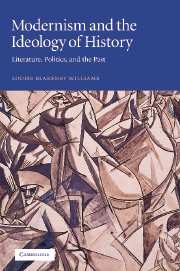Book contents
- Frontmatter
- Contents
- Acknowledgements
- Abbreviations
- Introduction
- 1 “Immaterial pleasure houses”: the initial aesthetic dilemma
- 2 “A more dream-heavy hour”: medievalist and progressive beginnings
- 3 “Pedantry and hysteria”: contemporary political problems
- 4 “A certain discipline”: radical conservative solutions
- 5 “A particularly lively wheel”: cyclic views emerge
- 6 “Our own image”: the example of Asian and non-Western cultures
- 7 In “the grip of the … vortex”: the proof of Post-Impressionist art
- 8 The “cycle dance”: cyclic history arrives
- 9 “The Nightmare” and beyond: the First World War and mature cyclic theories
- Conclusion
- Notes
- Index
5 - “A particularly lively wheel”: cyclic views emerge
Published online by Cambridge University Press: 22 September 2009
- Frontmatter
- Contents
- Acknowledgements
- Abbreviations
- Introduction
- 1 “Immaterial pleasure houses”: the initial aesthetic dilemma
- 2 “A more dream-heavy hour”: medievalist and progressive beginnings
- 3 “Pedantry and hysteria”: contemporary political problems
- 4 “A certain discipline”: radical conservative solutions
- 5 “A particularly lively wheel”: cyclic views emerge
- 6 “Our own image”: the example of Asian and non-Western cultures
- 7 In “the grip of the … vortex”: the proof of Post-Impressionist art
- 8 The “cycle dance”: cyclic history arrives
- 9 “The Nightmare” and beyond: the First World War and mature cyclic theories
- Conclusion
- Notes
- Index
Summary
Mr. Hulme launched forth on a diatribe against … all those who take the Spiral as the symbol of the Nature of man, and declared that if ever he were made a Peer he would take as his insignia a particularly lively Wheel, chastising a complacent Spiral.
Cambridge Magazine, March 9, 1912.One day in 1908 a devastatingly handsome young man, who looked a great deal like Lord Byron, suddenly dropped from the sky onto a street corner in London. Police Constable 742L, who witnessed the miraculous event, could tell from the stranger's impeccable evening dress and from his disturbingly eloquent speech that this was an aristocrat, despite his odd name of Fybus Poldo. Unknown to PC 742L, this was no ordinary gentleman. He was, in fact, the Greek god Phoebus Apollo come from heaven to twentieth-century England to determine if religion could be brought back to the modern world. He was promptly arrested.
So goes the opening of Ford Madox Ford's 1908 novel, Mr. Apollo. Despite his arrest, by the end of the novel Apollo is quite successful in his task. He meets a number of young people who are tired of the hopeless materialism of the scientific age in which they live, and who are looking for spiritual fulfillment. A new age of religion, similar to a better period of the past was, therefore, in the process of returning – with the help of an ancient Greek god-aristocrat, of course.
- Type
- Chapter
- Information
- Modernism and the Ideology of HistoryLiterature, Politics, and the Past, pp. 91 - 113Publisher: Cambridge University PressPrint publication year: 2002



